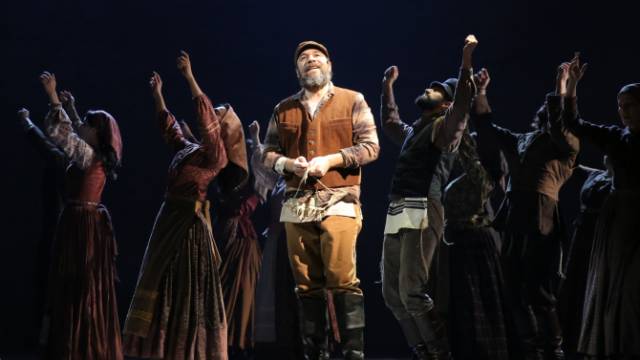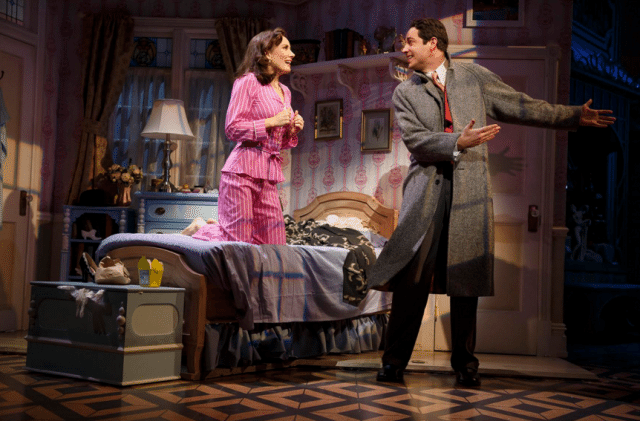

Lyricist Sheldon Harnick is a bona fide Broadway legend, having created over a dozen musicals, many of which (particularly his collaborations with composer Jerry Bock) became part of the theatrical canon. He is also one of the rare writers who was awarded the Pulitzer prize for his work on a musical, winning in 1960 for Fiorello! which incidentally also turned to be the only tie for Best Musical in Tony Awards history. That it tied with Rodgers and Hammerstein’s The Sound of Music is fitting, if only because it signified the passing of the baton from one great generation of composers to the next, for Harnick and Bock became the epitome of Broadway in the 1960s.
With shows like The Apple Tree and Tenderloin, Harnick proved that there was no territory he was afraid to tackle, but it’s perhaps with the two-punch of She Loves Me from 1963, and Fiddler on the Roof from 1964 that he solidified his status as one of the all time greats. The shows could not be more different from each other if they tried; one is a frothy, delightful romantic comedy, the other a heartbreaking essay on diaspora. One is filled with playful tunes straight out of Hungarian folklore, the other with mournful tunes that pay tribute to Jewish traditions.
That both shows were revived during the 2015-2016 Broadway season is testament to the staying power of Harnick’s work. At the Broadway Theatre, Fiddler has become now more poignant than ever, as it’s been reexamined by director Bartlett Sher, who has brought its political connotations to surface in unexpected ways, while at Studio 54, Laura Benanti and Jane Krakowski lead an all-star cast of She Loves Me, that is memorable because it turns an evening at the theatre into an opportunity for romance. That Scott Ellis’ straightforward production can’t help but make one think of love in the age of Tinder, is yet more proof that Harnick was always ahead of his time.
To celebrate the opening of She Loves Me and the release of the Fiddler on the Roof cast recording I spoke to Mr. Harnick about the history behind some of the shows’ greatest songs, his inspiration, and what he discovers revival after revival.
Two of your musicals are playing within a couple of blocks from each other on Broadway right now, congratulations!
I know, it’s remarkable and wonderful!
When you started making musicals, there were shows by Rodgers & Hammerstein playing in more than one theater at once, did you imagine the same would happen with your shows?
I didn't imagine that, but I certainly hoped that would be the case.
What do you discover when you hear/see different actors take on the characters you’ve written?
It’s always a pleasure to see what a good actor does with what you’ve written and what they bring to it. Sometimes they find ways to do songs that you’ve never seen before, so that’s very rewarding.
You’ve said before that by the time Fiddler came about you’d realized that the nature of musical theatre creation was all in the rewriting. But is there any song you wrote for any musical, that was cut, that you particularly cherish?
There’s a song from Fiddler called “Dear Sweet Sewing Machine”, everybody loved that song but when we opened in Detroit in our pre-Broadway run we realized in context, in the show itself, the song did not work. We tried it about three times and it didn’t work, so we had to cut it and it was painful because we loved the song. In fact we loved it so much we asked the producer of the new cast album if we could include the song in the new cast album even though it wasn’t in the show, and they agreed, so when you hear the cast album you’ll hear “Dear Sweet Sewing Machine”.
You’ve said you briefly wrote comedic poetry when you were younger. What I’m curious to know, is there a relationship between musical theatre lyrics and poetry writing?
I don’t think so, I was in grammar school, very, very young and those comic poems had nothing to do with understanding human behavior, they were just comic notions. Writing for the theatre of course, the comedy depends on the behavior of the person who’s singing and their traits as a human being, so they’re very different approaches to comedy.

When you were writing Fiddler, America was going through a climate of paranoia, cynicism and social unrest. The show tries to establish a bridge between "tradition" and "progression"? Was this something you had in mind when you were writing?
No, we based what we did on the short stories by Sholem Aleichem, we tried to realize what was in those stories, and we didn’t try to put into those stories anything based on what was happening in America at the time. We were just interested in what Sholem Aleichem had written because we loved those stories and we tries to realize them as best we could.
What’s so wonderful and heartbreaking about the show is that it’s always relevant. When I saw the revival I couldn’t help but think of Syria.
What’s so sad is that even back in 1964 when the show opened there were similar things happening, this show has always been contemporary in that sense. Every time it gets to the last scene it reminds people of something that’s happening somewhere in the world. It’s a tragic world we live in, and the last scene in Fiddler always is relevant.
Fiorello! was the third of eight musicals to win the Pulitzer Prize for Drama. Was there any hint that you guys were headed to a win?
No! It was a wonderful surprise! At that time I’m not sure I even knew what the qualifications for the Pulitzer prize were. I think Harold Prince called to tell us we won it, and we were all thrilled.
Do you feel musical theatre still doesn’t get the literary respect of “straight-plays” when you look at the stats of something like the Pulitzer Prize for example?
Yes, musicals at one time in this country were looked upon as frivolous entertainment and nothing more than that, but now I think everyone recognizes that musicals can say very important things, such as Hamilton, which is a wonderfully perceptive look at our founding fathers.
Do you feel any aspects of Fiorello! can be applied to today’s political or social climate?
Yes I do, the remarkable thing about Fiorello La Guardia is his sense of integrity, he was an extraordinarily honest man, you look at him and you look around and you see so many politicians who don’t have that sense of integrity and honesty, and you only wish they had it. You wish there were more Fiorellos in the world.
Although She Loves Me might technically be seen as the story of Amalia and Georg it’s filled with so many rich songs outside of their romance. In a way there could be a musical about each character in the show.
Yes, both Joe Masteroff who wrote the book, and Jerry Bock and I, loved every character in this show, and we wanted to write songs for every character, not just for the two leads. As a matter of fact the way we look at this show is that it’s not about one romance, it’s about three different romances: Georg and Amalia, it’s about Ilona and even about Maraczek, who has the tragic romance of a long term marriage in which his wife just starts to leave.

How did you first encounter the story of the musical? Was it the play Parfumerie, or The Shop Around the Corner?
Larry Kasha the producer, called Jerry Bock and me, we went to his office and he asked us if we knew The Shop Around the Corner, and both of us knew and loved the film, so we were delighted when he told us he had the rights to adapt it into a musical. We just couldn’t wait to do it.
“Twelve Days of Christmas” in She Loves Me is one of the few Christmas songs in Broadway musicals, and it’s so lovely.
We also had written a song called “Christmas Eve” which was to be sung when Mr. Maraczek comes back to the shop with a bottle of champagne and they all gather to have a toast. Once we saw the song in rehearsal we realized that the show was so long and there was no place for that song, so we cut it unfortunately. So we have an available Christmas song if anybody wants to record it.
Any speculation on why there are so few Christmas songs in musical theatre?
I guess it’s because there are not many shows where the story takes place during Christmas, I think every musical that has Christmas in its plot, has a Christmas song. But there aren’t many shows that revolve around the Christmas period. I think the songwriters for every musical would be delighted to write a Christmas song!
I’m always in awe of the structure of “Sounds While Selling” in She Loves Me which has the ingenious idea of having three conversations of seller and buyer overlapping to make a hilarious song. What made you come up with that idea and what was it like writing the lyrics for it and deciding where to have the overlaps for best comedic effect?
That was Jerry Bock’s idea, he was driving somewhere and he was listening to the radio in his car and he started to press the buttons to change the stations and it made him laugh, because every time he pressed the button he would get a new conversation, which didn’t make sense in terms of the station he’d just been listening to, so it was his idea to write a number like that for the clerks.
In the summer of 2015 I saw the York Theatre Company’s production of The Rothschilds, which is also very dark. At any point did you have the notion that musicals needed to touch on more serious subject matters?
We loved the story of the Rothschilds, we knew it was a dark story, but it didn’t matter, it’s such a good story and it was a story that could benefit from having music in it. We tried to realize all of the drama in the story and didn’t worry whether it was too dark or not.
You’ve been doing musical theatre for decades and you’ve seen the climate of Broadway change. Contemporary musical theatre gets a lot of flack for adapting popular fiction or film to stage. I’m curious to your thoughts on this, considering that you and Bock have pulled inspiration for your musicals from so many varied sources. Why do you think people criticize adaptations?
Because they’re very stupid! (Laughs) No, musical theatre, including opera, have always done adaptations, and there is nothing wrong with that, nothing wrong at all. I don’t understand why people would downgrade something because it’s an adaptation, rather than an original work. There are many more adaptations than there are original works, it’s hard to be original.
She Loves Me and Fiddler on the Roof are now open. The 2016 Broadway Cast Recording of Fiddler on the Roof is in stores on March 18.